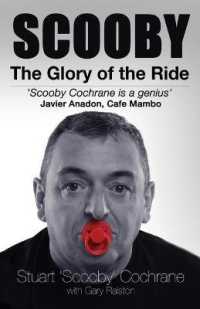- ホーム
- > 洋書
- > 英文書
- > Psychology
Full Description
Originally published in 1994, the previous 15 years had seen significant advances in cognitive analysis of many neuropsychological syndromes. In such analyses, investigators aimed to understand cognitive deficits in terms of impairments to particular processes within a model of normal cognitive performance. In addition, evidence from cognitive impairments could be used to help constrain theories of normal performance. However, at the time cognitive neuropsychological analyses had made little penetration of clinical rehabilitation practice. This situation was beginning to change, though, as in several areas of study, clinical practitioners used cognitive models and cognitive neuropsychological analyses to guide both assessment and rehabilitation. The marrying of cognitive neuropsychology to cognitive rehabilitation offered great promise for producing a principled approach to rehabilitation, tailored to the cognitive deficits in particular patients. This book brings together a series of empirical and review papers dealing with recent attempts to apply cognitive neuropsychology to cognitive rehabilitation. The book is divided into 6 topic areas covering: Visual Object Recognition, Visual Attention, Motor Performance, Spoken Language and Phonological Skills, Written Language, and Memory. Within each topic, there is a review chapter, covering both recent advances in cognitive theory and attempts to apply this to rehabilitation, followed by empirical papers reporting on rehabilitation-related research. There are, additionally, overview chapters covering the general implications of cognitive neuropsychological research for cognitive rehabilitation, and introductions to the chapters within each topic area.
The papers present both a state-of-the-art review and an attempt to evaluate the strengths and weaknesses of the cognitive neuropsychological approach to cognitive rehabilitation. Papers evaluate the utility of cognitive neuropsychological analyses for both diagnosis and the design of therapy, and they also assess the use of rehabilitation research for testing theories of normal performance. The book was essential reading for all those interested in the application of cognitive neuropsychology to cognitive rehabilitation at the time. Today it can be read in its historical context.
Contents
List of Contributors. Preface. Part One: Overview 1. Cognitive Neuropsychology and Cognitive Rehabilitation: A Marriage of Equal Partners? M.J. Riddoch and G.W. Humphreys 2. Cognitive Neuropsychology and Rehabilitation M. Coltheart, A. Bates and A. Castles Part Two: Visual Object Recognition 3. Visual Object Processing in Normality and Pathology: Implications for Rehabilitation G. W. Humphreys and M. J. Riddoch 4. Developmental Prosopagnosia: A Functional Analysis and Implications for Remediation Ruth Campbell and Edward De Haan 5. Rehabilitation of Semantic Memory Impairments Giuseppe Sartori, Michelle Miozzo and Remo Job Part Three: Visual Attention 6. Towards an Understanding of Neglect M.J. Riddoch and G.W. Humphreys 7. On the Rehabilitation of Hemispatial Neglect Elisabetta Làdavas, Giacomo Menghini and Carlo Umlità 8. The Rehabilitation of Attentional and Hemi-inattentional Disorders Ian H. Robertson 9. Task Specific Effects in the Rehabilitation of Unilateral Neglect Sheila Lennon 10. Early Ipsilateral Orienting of Attention in Patients with Contralateral Neglect Patrizia D'Erme, Guido Gainotti, Paolo Bartolomeo and Ian Robertson Part Four: Motor Performance 11. From Motor Images to Motor Programs M. Jeannerod and J. Decety 12. Prevention of Early Immobility in Patients with Parkinson's Disease: A Cognitive Strategy Training for Turning in Bed and Rising from a Chair Y.P.T. Kamsma, W. H. Brouwer and J.P.W.F. Lakke 13. Rehabilitation of a Case of Ideomotor Apraxia Emerita Pilgrim and G. W. Humphreys Part Five: Spoken Language and Phonological Skills 14. Cognitive Neuropsychology and the Remediation of Disorders of Spoken Language Andrew Ellis, Sue Franklin and Alison Crerar 15. Verb Retrieval and Sentence Construction: Effects of Targeted Intervention Charlotte C. Mitchum and Rita Sloan Berndt 16. Application of Cognitive Models to Remediation in Cases of Developmental Dyslexia Philip H. K. Seymour and Frances Bunce 17. Phonological Processing Deficits as the Basis of Developmental Dyslexia: Implications for Remediation Linda S. Siegel 18. The Association between Reading Strategies in Poor Readers and their Visual and Phonological Segmentation Skills Rhona S. Johnston, Marjorie Anderson and Lynne G. Duncan Part Six: Written Language 19. Reading, Writing, and Rehabilitation: A Reckoning Karalyn Patterson 20. Theories of Lexical Processing and Rehabilitation of Lexical Deficits Argye E. Hillis and Alfonso Caramazza 21. Cognitive Approaches to Writing Rehabilitation: From Single Case to Group Studies Sergio Carlomagno, Alessandro Iavarone and Anna Colombo 22. Approaches to the Rehabilitation of "Phonological Assembly": Elaborating the Model of Nonlexical Reading Rita Sloan Berndt and Charlotte C. Mitchum Part Seven: Memory 23. Domain-specific Learning and Remediation of Memory Disorders Elizabeth L. Glisky, Daniel L. Schachter and Meryl A. Butters 24. The Flexibility of Implicit Memory: An Exploration Using Discrimination Learning Alan D. Pickering 25. Imagery as a Mnemonic Aid in Amnesia Patients: Effects of Amnesia Subtype and Severity Anders Gade. Author Index. Subject Index.








